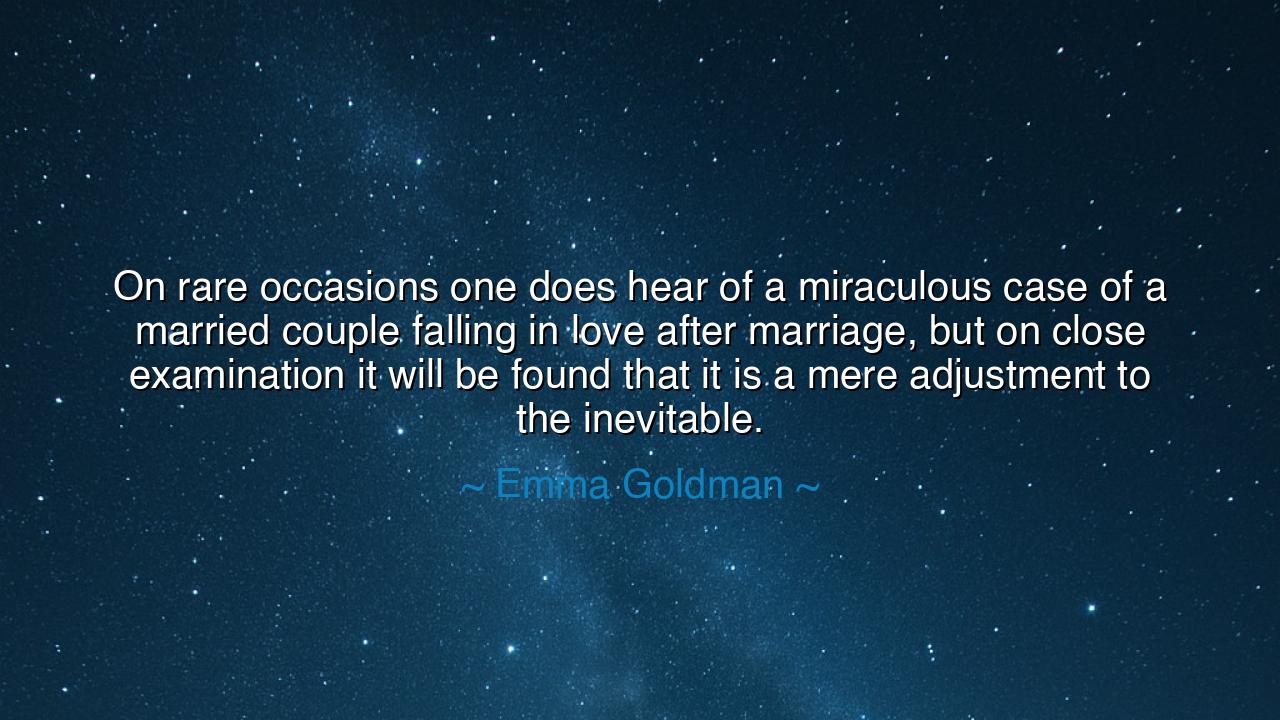
On rare occasions one does hear of a miraculous case of a married
On rare occasions one does hear of a miraculous case of a married couple falling in love after marriage, but on close examination it will be found that it is a mere adjustment to the inevitable.






The words of Emma Goldman, fierce and unflinching, strike like lightning through the illusions of romance: “On rare occasions one does hear of a miraculous case of a married couple falling in love after marriage, but on close examination it will be found that it is a mere adjustment to the inevitable.”
In this single line lies a philosophy both sorrowful and defiant — the recognition that love and marriage, though often joined in name, are not always joined in truth. Goldman, the great anarchist and thinker of the early twentieth century, looked upon the institution of marriage not as a haven of affection, but as a structure built by society to contain the wildness of the human heart. Her words challenge the belief that love naturally blooms from obligation; instead, she suggests that what many call “falling in love” after marriage is but a reconciliation with confinement, a surrender that the soul disguises as peace.
To understand her meaning, one must first understand her life. Emma Goldman lived not as a dreamer of comfort, but as a seeker of freedom. Born in Russia, she fled tyranny only to find new chains in the social orders of the West — chains of law, custom, and marriage. To her, love was sacred precisely because it was free, spontaneous, and ungoverned by decree. She saw too many unions where the ceremony came first and affection was expected to follow, as though love could be commanded by vows. And so she wrote these words with both pity and irony, knowing that some who appear to have found love within marriage have merely made peace with resignation — mistaking familiarity for affection, and endurance for passion.
In her time, the world praised duty more than desire. A woman’s life was measured by her submission to husband and home, and her worth was counted by how quietly she endured. Goldman’s fire burned against this injustice. She argued that when two souls are bound by obligation rather than by choice, what grows between them is not true love, but a kind of adaptation to necessity. It is like a bird that, when caged too long, forgets the sky — and begins to sing only to make peace with its bars. In her words, “the inevitable” is not destiny, but the social expectation that love must exist within marriage, even when it does not.
Consider, for example, the story of Queen Victoria and Prince Albert. Their marriage, arranged in youth, began as duty but grew into deep affection. To the world, it appeared miraculous — a romance blossoming within the boundaries of royal expectation. Yet even their love, noble as it was, existed within the confines of empire and etiquette. Victoria herself admitted that she had learned to love Albert because she must. Their affection, though genuine, was shaped by necessity — a beautiful adjustment to a role neither could escape. Goldman would see in this not proof of marriage’s triumph, but evidence of the human heart’s power to adapt, even to its own imprisonment.
Yet we must not read her words as cynicism alone. There is, hidden within them, a deeper understanding of human nature. Goldman does not deny that love may grow within marriage; she only reminds us that such love is rare and conditional — it must defy the forces that seek to tame it. When love is born freely, without command, it is like a river that carves its own course; but when love is assigned, it must bend and twist until it finds meaning in what is already decided. Thus, those who “fall in love after marriage,” in her eyes, are not blessed by fate, but skilled in the art of making peace with their own reality.
The wisdom here is not to despise marriage, but to see it clearly. Love cannot be manufactured by promise or law; it must be chosen, renewed, and desired, not assumed. True union does not arise from duty, but from the courage to remain authentic — to love not because one must, but because one wants to. Goldman warns that when love is expected, it withers; but when it is allowed to grow in freedom, it thrives even within structure. The miracle, then, is not that two people in marriage fall in love — but that they remain free enough to choose each other every day.
So, my child, take heed of this lesson: never mistake habit for love, nor comfort for connection. To truly love is to remain awake — to resist the slow surrender that turns passion into convenience. If you choose marriage, let it be a bond of freedom and truth, not of expectation and pretense. Nurture love not as a duty, but as a living flame — one that requires air, honesty, and courage to survive. For only then can marriage rise above the “inevitable” and become what Goldman herself longed for: not an adjustment to life’s limits, but a defiance of them — the union of two souls who, even in closeness, remain free.






AAdministratorAdministrator
Welcome, honored guests. Please leave a comment, we will respond soon